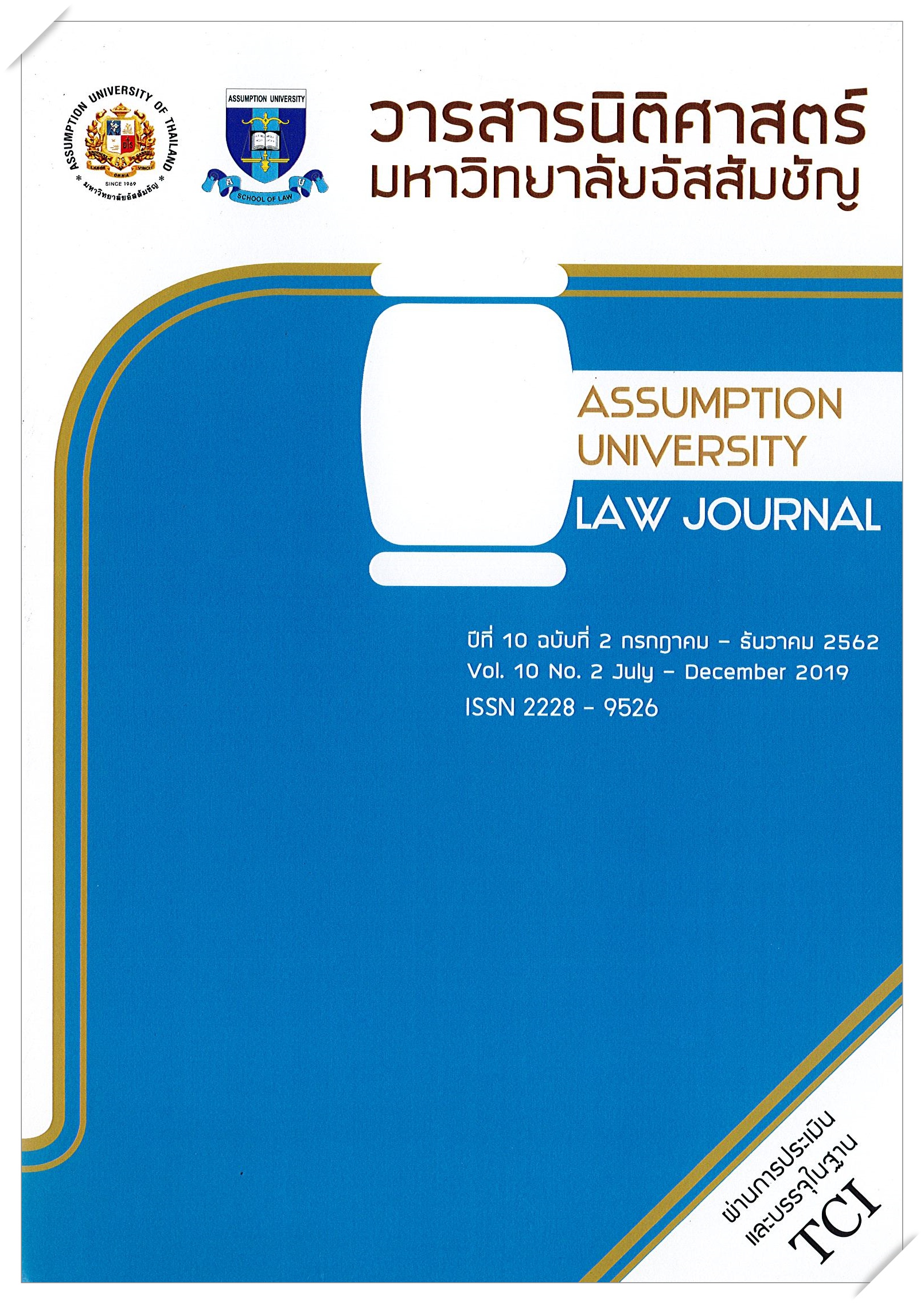ปัญหาเกี่ยวกับการแก้ไขเพิ่มเติมรัฐธรรมนูญในประเทศไทย<br> The Problems of the Constitutional Amendment Process in Thailand
Keywords:
รัฐธรรมนูญ, การแก้ไขเพิ่มเติมรัฐธรรมนูญ, ศาลรัฐธรรมนูญ, การควบคุมความชอบด้วยรัฐธรรมนูญ, Constitution, Constitutional Amendment Process, Constitutional Court, Constitutional reviewAbstract
บทคัดย่อ
บทความฉบับนี้เป็นผลจากการศึกษาปัญหาเกี่ยวกับการแก้ไขรัฐธรรมนูญในประเทศไทยโดยมีวัตถุประสงค์ประการแรกเพื่อนำเสนอปรับปรุงกระบวนการแก้ไขรัฐธรรมนูญให้มีประสิทธิภาพและมีความยืดหยุ่น อันจะส่งผลให้รัฐธรรมนูญสามารถปรับตัวให้เข้ากับความต้องการของพลเมืองไทยและสภาวการณ์โลกได้โดยไม่จำเป็นต้องล้มล้างรัฐธรรมนูญเดิมและจัดทำฉบับใหม่ ประการที่สอง เพื่อนำเสนอปรับปรุงกระบวนการควบคุมความชอบด้วยรัฐธรรมนูญในการแก้ไขรัฐธรรมนูญให้ชัดเจน
เนื่องด้วยกระบวนการแก้ไขรัฐธรรมนูญตามรัฐธรรมนูญ ฯ (พ.ศ. 2560) มีกระบวนการดำเนินการที่ยากมากในการดำเนินการแก้ไขให้บรรลุผล ซึ่งเมื่อพิจารณาข้อเท็จจริงทางการเมืองประกอบย่อมเล็งเห็นได้ว่า
รัฐธรรมนูญฉบับนี้ไม่ได้ถูกออกแบบมาให้แก้ไขเพิ่มเติมได้ ซึ่งอาจทำให้รัฐธรรมนูญไม่สามารถปรับตัวให้เข้ากับความต้องการของพลเมืองไทยได้ ประกอบกับการกำหนดอำนาจศาลรัฐธรรมนูญในการตรวจสอบการแก้ไขรัฐธรรมนูญยังไม่มีความชัดเจนในบางประเด็น จึงอาจทำให้มีข้อโต้แย้งในเขตอำนาจของศาลรัฐธรรมนูญในประเด็นดังกล่าวได้
ในการศึกษาวิจัยฉบับนี้เป็นการศึกษาวิจัยเชิงคุณภาพ โดยการศึกษาเปรียบเทียบกฎหมายรัฐธรรมนูญในประเด็นการแก้ไขเพิ่มเติมรัฐธรรมนูญและการควบคุมความชอบด้วยรัฐธรรมนูญของการแก้ไขรัฐธรรมนูญในประเทศเยอรมัน ประเทศฝรั่งเศส และประเทศอินเดีย และศึกษาแนวทางปฏิบัติของประเทศดังกล่าวเพื่อใช้เป็นเกณฑ์ในการวิเคราะห์กระบวนการแก้ไขรัฐธรรมนูญและกระบวนการควบคุมความชอบด้วยรัฐธรรมนูญในการแก้ไขรัฐธรรมนูญในประเทศไทย
จากการศึกษาวิจัย ปรากฏแนวทางแก้ไขสภาพปัญหาดังกล่าว ดังนี้ ประการแรก เสนอแก้ไขรัฐธรรมนูญ มาตรา 256 (3) (4) (6) (8) เพื่อให้รูปแบบการแก้ไขรัฐธรรมนูญง่ายขึ้น ในรัฐธรรมนูญแต่ละหมวดมีกระบวนความยากง่ายที่แตกต่างกัน และองค์กรที่มีอำนาจดำเนินการแก้ไขรัฐธรรมนูญให้มีความเชื่อมโยงกับประชาชนมากขึ้น ประการที่สอง เสนอแก้ไขรัฐธรรมนูญ 256 (9) เพิ่มอำนาจศาลรัฐธรรมนูญให้ชัดเจนในการตรวจสอบการแก้ไขรัฐธรรมนูญทั้งในทางรูปแบบและเนื้อหา
Abstract
This study aims, firstly, to propose improvements to the process of amending the constitution of Thailand to make such amendments more productive and diverse and, secondly, to propose improvements to the process of reviewing amendments to the Constitution in light of the constitutional amendment processes contained in the Constitution of the Kingdom of Thailand of 2017, which include an arduous editing process. When considering the political realities involved in the process of proposing constitutional amendments, the authority to establish the constitution may not allow the constitution to be modified. As a result, the constitution not to be able to adapt to the changing requirements of the people. In spite of the determination of the Constitutional Court's power to review
amendments to the Constitution, there is still no clarity on specific issues. This may result in arguments over the jurisdiction of the Constitutional Court regarding such issues.
This is a qualitative research study that compares the constitutional laws, constitutional amendment processes, and the standards constitutional for review in Germany, France, and India. It also examines how the practices of these countries can be used as criteria for analyzing the constitutional amendment process and standard for constitutional review in Thailand.
This research study suggests guidelines for solving such problems. These include, firstly, proposing amendments to Section 256 (3) (4) (6) (8) of the Constitution that would simplify the amendment procedures. There are several steps in the constitutional amendment process in each category. Moreover, institutions that have the power to amend the Constitution should be more connected with the people. Secondly, proposing amendments to Section 256 (9) of the Constitution that increase the power of the Constitutional Court to review the constitutional amendments both in the process and content of the Constitution.
Downloads
Published
Issue
Section
License
- บทความทุกเรื่องได้รับการตรวจทางวิชาการโดยผู้ทรงคุณวุฒิ (Reader) จากภายในและนอกมหาวิทยาลัย
- ความคิดเห็นใดๆ ที่ลงตีพิมพ์ในวารสารกฎหมายคณะนิติศาสตร์ มหาวิทยาลัยอัสสัมชัญ เป็นของผู้เขียน (ความคิดเห็นใดๆ ของผู้เขียน กองบรรณาธิการวารสารกฎหมายคณะนิติศาสตร์ มหาวิทยาลัยอัสสัมชัญไม่จำเป็นต้องเห็นด้วย)
- กองบรรณาธิการวารสารกฎหมายคณะนิติศาสตร์ มหาวิทยาลัยอัสสัมชัญ ไม่สงวนสิทธิในการคัดลอก แต่ให้อ้างอิงแสดงแหล่งที่มาด้วย


